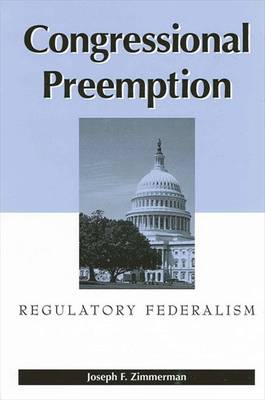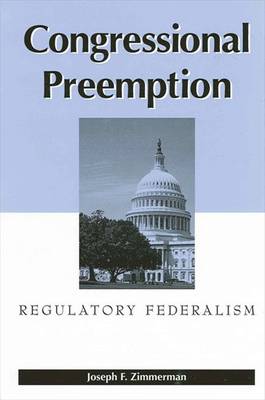
- Retrait gratuit dans votre magasin Club
- 7.000.000 titres dans notre catalogue
- Payer en toute sécurité
- Toujours un magasin près de chez vous
- Retrait gratuit dans votre magasin Club
- 7.000.0000 titres dans notre catalogue
- Payer en toute sécurité
- Toujours un magasin près de chez vous
Description
Examines the use of preemption powers by Congress to completely or partially remove regulatory authority from state and local governments.
Congressional Preemption provides an in-depth account of the use of preemption powers by Congress to either partially or completely remove regulatory authority from state and local governments in a wide variety of fields. Author Joseph F. Zimmerman exposes the inadequacies of the two current theories of United States federalism-dual and cooperative-by exploring the impact of Congress' frequent use of its preemption powers since 1965. While the dual and cooperative federalism theories retain a degree of explanatory power, Zimmerman considers why they do not explain the profound systemic changes produced by congressional preemption. Other topics covered include congressional use of conditional grants-in-aid, crossover sanctions, tax credits, tax sanctions, and partial and complete redemption; the theory of political safeguards of federalism; and the Blackmun Thesis, which encourages states to seek relief from preemption statutes in Congress and not the courts. The book concludes with postulates of a broader theory of federalism and recommendations addressed to Congress to reinvigorate the federal system.
Spécifications
Parties prenantes
- Auteur(s) :
- Editeur:
Contenu
- Nombre de pages :
- 302
- Langue:
- Anglais
Caractéristiques
- EAN:
- 9780791465646
- Date de parution :
- 01-06-06
- Format:
- Livre broché
- Format numérique:
- Trade paperback (VS)
- Dimensions :
- 154 mm x 228 mm
- Poids :
- 417 g

Les avis
Nous publions uniquement les avis qui respectent les conditions requises. Consultez nos conditions pour les avis.






